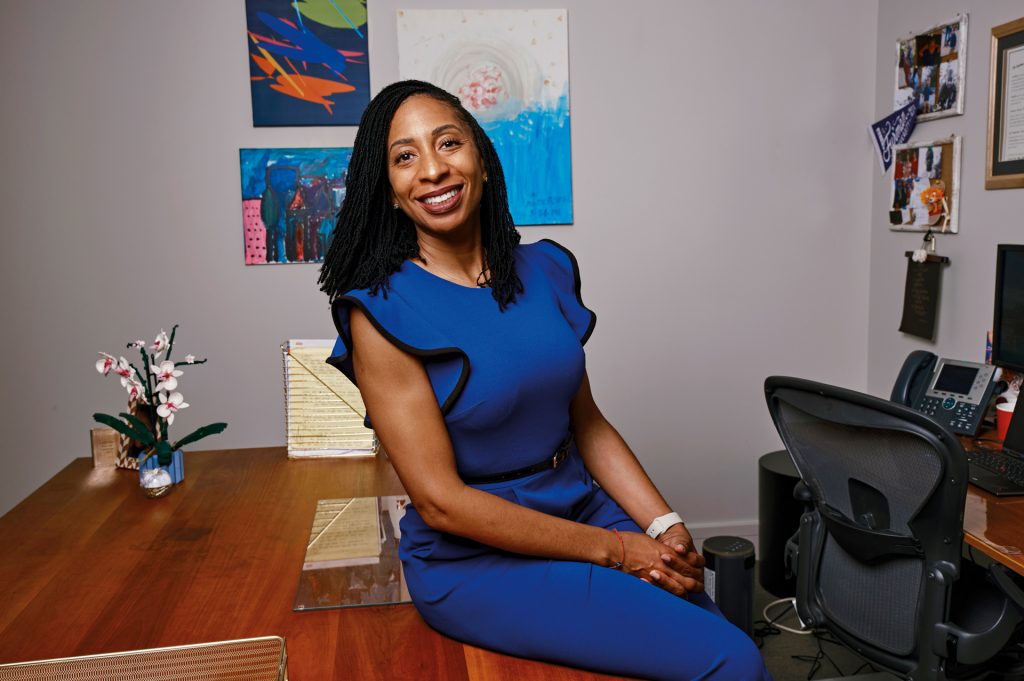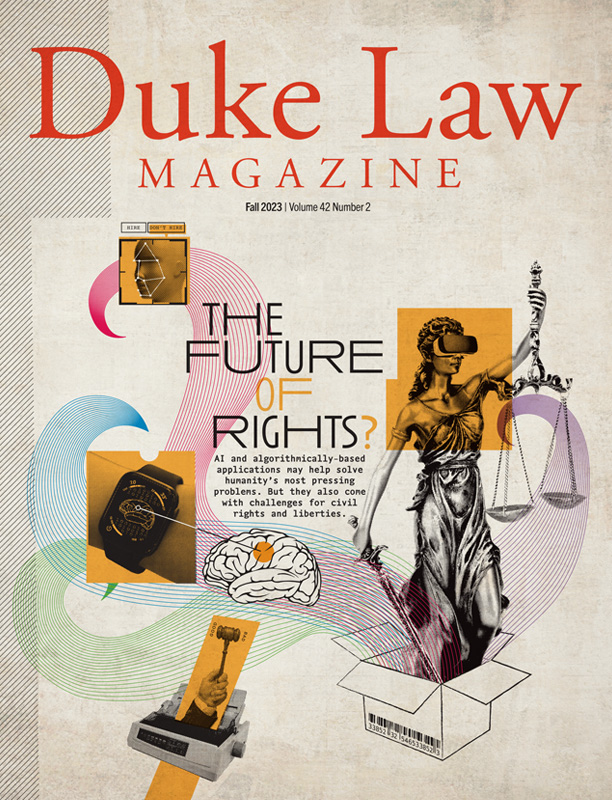
Alumni Profile
Yendelela Neely Holston ’06
Growing up in Laurens, South Carolina, Yendelela Neely Holston ’06 was aware of racism. She recalls watching a Ku Klux Klan march at eight years old, and being overlooked for academic opportunities at school for which she was well qualified.
But she didn’t experience its most overt, direct form until a spring break trip to Myrtle Beach, when she and friends from Furman University were forced to leave a restaurant one afternoon because of their skin color. While waiting for their order at a seafood joint, employees told them they couldn’t sit down and that the restaurant was closed, even though signs clearly stated otherwise. Police called to the scene accused them of “creating a disturbance” and ushered them away — without the food they had purchased.
While the group suspected the cause, it was not until they were welcomed into a neighboring restaurant that it was directly confirmed; that owner apologized and explained that the establishment was notorious for its mistreatment of Black customers.
“I was, one, just shocked and upset that in 2001 I had been refused the right to eat in a restaurant because I am Black, and two, that the police co-signed on the action, condoned it,” Holston says. “I knew both of these things were illegal, but I also didn’t have any recourse.”
The experience, and the powerlessness she felt, would propel Holston toward law school and addressing inequities through her legal work, community service, and speaking out against injustices.
“I am on the side of creating an injury-free environment, and it aligns with my life goal and my life mission,” says Holston, a partner at Kilpatrick Townsend in Atlanta and the firm’s chief diversity and inclusion officer. “I recounted that experience at the beach in my Duke essay because that was the turning point for me, knowing that this conduct was wrong but not knowing enough about the laws and my rights to stand up against it.”
That passion guides Holston in her labor and employment practice, where she helps corporate clients create work environments that are inclusive, non-discriminatory, and legally compliant. As a leader at the firm where she has spent most of her career, Holston also works for greater representation of people of color in the legal profession, particularly women of color, who made up less than 1% of law firm partners nationwide in 2021.
In February 2023 Holston was named president of the board of directors of Atlanta Legal Aid Society, where she has served as a board member since 2014.
Atlanta Legal Aid handles some 20,000 cases each year for clients in five metro counties, where housing needs have become acute in the past few years. Half of the organization’s $42.3 million economic impact last year was in housing benefits.
“As a child, I remember my parents having legal issues that are the kind handled by Legal Aid and not having a place to turn,” Holston said. “The legal system impacts us all in some shape or form and thus it should be accessible to us all. Money should not be a barrier.”
“I am on the side of creating an injury-free environment, and it aligns with my life goal and my life mission.”
She is also a trustee of her undergraduate alma mater, where she has funded one scholarship that gives a student from a public high school the chance to study abroad, as she did in southern Africa, and another to help close the gap between tuition and financial aid.
A love of rules and procedure
Holston grew up in a town with a long history of racial tension. Established in 1785, Laurens is named for Charleston planter and merchant Henry Laurens, who enslaved nearly 300 people and co-founded the continent’s largest slave trading company.
By the late 1800s, as the textile industry began to grow in the county and nearby Greenville, South Carolina’s governor pushed for segregation. In 1915, the state passed a law prohibiting people of different races from working alongside each other.
Today, roughly 72% of the 9,300 residents are white and about a quarter are Black, according to 2022 Census estimates. By the time Holston was a child, desegregation was well entrenched in Laurens, but racism was alive and well at the Redneck Shop, which sold Klan robes and other white supremacist paraphernalia, including photos of lynchings, and served as a meeting place for white nationalist groups.
A Black Baptist minister and civil rights activist, Reverend David Kennedy, bought the building six years ago, and his relationship with the former Klansman who owned it is depicted in the 2018 film Burden. Today, Kennedy plans to turn the building into a museum for diversity.
“Race is still very prevalent — and at the same time, also not,” Holston says. “There is a Black side that’s separated from the white side of Laurens.”
Holston’s family lived on an integrated street one block from public housing. They were limited in means, but not in striving.
“We grew up poor,” Holston states. “Our parents were trying to keep us grounded in understanding our condition — but also not being defined by it or feeling stuck in it.”
In school, though, she began to sense race playing a subtle role. She was often the only Black person in her classes, and despite being an excellent student, guidance counselors and teachers didn’t tell her or her parents about advanced classes that were available. When she noticed that white classmates were taking an honors English class she didn’t know about, Holston realized that withholding knowledge is another form of discrimination.
Grounded in the past, looking to the future
Holston would go on to double-major in history and political science at Furman, where Don Aiesi ’65, who taught political science at the university for more than 50 years before retiring in 2018, encouraged her to apply to Duke Law School. At Duke, she discovered an affinity for rules and procedure, thanks to Trina Jones, the Jerome M. Culp Distinguished Professor of Law and director of the Center on Law, Race & Policy, who made Civil Procedure “exciting.”
“She taught you to think beyond the rules and critically look at them,” Holston says. “The whole analysis was more than procedure.”
That focus on rules and procedure has enabled her as a lawyer to win many cases in discovery, she says.
Lately Holston has been addressing clients’ concerns over the U.S. Supreme Court’s ruling in June that race-based admissions programs at Harvard and the University of North Carolina violated the Equal Protection Clause of the Fourteenth Amendment. Opponents of diversity, equity, and inclusion initiatives have set their sights on corporate programs.
But Holston says the ruling should not change the corporate landscape. “The Fourteenth Amendment doesn’t apply in corporate America,” she says. And, she points out, “Title VII jurisprudence, which does apply, is already very clear on when and how a company can act to correct its prior racially discriminatory behavior.”
Diversity and inclusion initiatives fall within this and Equal Employment Opportunity Commission guidance that a company can aspire to correct an existing race detriment within the organization, she notes.
Holston keeps at hand a printout of the Court’s opinion. It’s heavily marked up, with numerous colored tabs marking passages. The ruling feels personal, because Holston knows some people believe she was accepted to a top law school because of race and not merit. In fact, she graduated with high marks from high school, college, and law school, evidenced by the magna cum laude and cum laude distinctions on her undergraduate and Duke Law diplomas, respectively.
Her own opinion is that it’s right and equitable to consider race in admissions to help correct historical systemic impediments that continue through longstanding practices. She prefers to call it “intentional intervention,” not “affirmative action.”
“We are intentionally intervening and saying that we appreciate the history of both de jure and de facto segregation, and that unless we intentionally act to disrupt and intervene, that status quo is going to continue,” she explains.
That history is why, on her office wall, Holston keeps a framed map of Laurens, a town with a hurtful past that inspired her to change the future.
“I keep the map of Laurens to stay grounded and to remind me of the socioeconomic position from which I came,” Holston says, “and also all of these things that shaped how I move about the world.”

